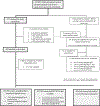Predictors of postpartum HIV care engagement for women enrolled in prevention of mother-to-child transmission (PMTCT) programs in Tanzania
- PMID: 30466304
- PMCID: PMC6443456
- DOI: 10.1080/09540121.2018.1550248
Predictors of postpartum HIV care engagement for women enrolled in prevention of mother-to-child transmission (PMTCT) programs in Tanzania
Abstract
Prevention of mother-to-child transmission of HIV (PMTCT) is a foundational component of a comprehensive HIV treatment program. In addition to preventing vertical transmission to children, PMTCT is an important catch-point for universal test-and-treat strategies that can reduce community viral load and slow the epidemic. However, systematic reviews suggest that care engagement in PMTCT programs is sub-optimal. This study enrolled a cohort of 200 women initiating PMTCT in Kilimanjaro, Tanzania, and followed them to assess HIV care engagement and associated factors. Six months after delivery, 42/200 (21%) of participants were identified as having poor care engagement, defined as HIV RNA >200 copies/mL or, if viral load was unavailable, being lost-to-follow-up in the clinical records or self-reporting being out of care. In a multivariable risk factor analysis, younger women were more likely to have poor postpartum care engagement; with each year of age, women were 7% less likely to have poor care engagement (aRR: 0.93; 95% CI: 0.89, 0.98). Additionally, women who had told at least one person about their HIV status were 47% less likely to have poor care engagement (aRR: .53; 95% CI: 0.29, 0.97). Among women who entered antenatal care with an established HIV diagnosis, those who were pregnant for the first time had increased risk of poor care engagement (aRR 4.16; 95% CI 1.53, 11.28). The findings suggest that care engagement remains a concern in PMTCT programs, and must be addressed to realize the goals of PMTCT. Comprehensive counseling on HIV disclosure, along with community-based stigma reduction programs to provide a supportive environment for people living with HIV, are crucial to address barriers to care engagement and support long-term treatment. Women presenting to antenatal care with an established HIV status require support for care engagement during the crucial period surrounding childbirth, particularly those pregnant for the first time.
Keywords: HIV; Tanzania; care engagement; pregnancy; prevention of mother-to-child transmission of HIV (PMTCT).
Conflict of interest statement
References
-
- Alcaide ML, Ramlagan S, Rodriguez VJ, Cook R, Peltzer K, Weiss SM, … Jones DL (2017). Self-Report and Dry Blood Spot Measurement of Antiretroviral Medications as Markers of Adherence in Pregnant Women in Rural South Africa. AIDS and Behavior, 21(7), 2135–2140. 10.1007/s10461-017-1760-3 - DOI - PMC - PubMed
-
- Atanga PN, Ndetan HT, Achidi EA, Meriki HD, Hoelscher M, & Kroidl A (2017). Retention in care and reasons for discontinuation of lifelong antiretroviral therapy in a cohort of Cameroonian pregnant and breastfeeding HIV-positive women initiating “Option B+” in the South West Region. Tropical Medicine & International Health, 22(2), 161–170. 10.1111/tmi.12816 - DOI - PubMed
-
- Bernier A, Yattassaye A, Beaulieu-Prévost D, Otis J, Henry E, Flores-Aranda J, … Keita BD (2018). Empowering Malian women living with HIV regarding serostatus disclosure management: Short-term effects of a community-based intervention. Patient Education and Counseling, 101(2), 248–255. 10.1016/j.pec.2017.07.030 - DOI - PubMed
-
- Buregyeya E, Naigino R, Mukose A, Makumbi F, Esiru G, Arinaitwe J, … Wanyenze RK (2017). Facilitators and barriers to uptake and adherence to lifelong antiretroviral therapy among HIV infected pregnant women in Uganda: a qualitative study. BMC Pregnancy and Childbirth, 17(1):94 10.1186/s12884-017-1276-x - DOI - PMC - PubMed
Publication types
MeSH terms
Substances
Grants and funding
LinkOut - more resources
Full Text Sources
Medical

